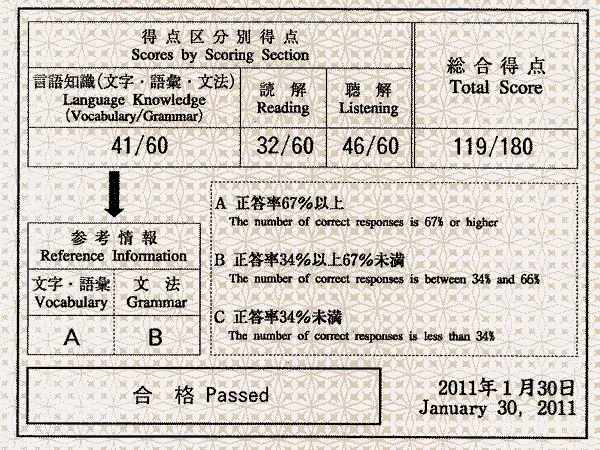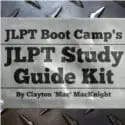 I just recently got my test results back from the December test. I took the N3 last December in training to pass the N2 hopefully this July. I was fairly confident I would pass. It still wasn’t a sure thing though.
I just recently got my test results back from the December test. I took the N3 last December in training to pass the N2 hopefully this July. I was fairly confident I would pass. It still wasn’t a sure thing though.
After taking the test, I felt like it might have actually been too easy. I might have aimed a little too low, but I guess it’s better to get the practice in before I move up to the next level.
When I did see my test scores I was a little surprised. Sections that I thought I did well in (reading) I scored lower on, while sections that I thought I did all right in (listening) I got higher scores in. I guess it just goes to show that you never know what is going to happen on the test.
Weak Point – Reading
The biggest thing I learned from doing the test is that my weak point is reading. I need to double check my understanding of my reading comprehension. This not only means doing more reading, but also doing more active reading.
Although I have outstanding vocabulary (I got an ‘A’ in this section) I have difficulty puzzling out what is trying to be conveyed in the reading passages. On the test, the readings usually use a lot of vague language (for N3+). This can make it difficult to clearly understand what is being conveyed.
What baffles me is that there were no abstract essays on the N3. Most of the reading passages were pretty clear about what they wanted to say. This is why I’m a little confused at my score. Obviously they weren’t as clear as I thought.
Weak Point – Plan of Attack
So, to prepare for this July, I’m going to increase the amount of reading I do every day. I just went to my favorite book recycling shop, Book Off, and picked up some used books to start reading.
This time I choose non-fiction books. Fiction books are great for vocabulary building because they provide context and you can picture what is going on in your head. However, non-fiction books are more like what you will see on the test. The language is more ambiguous and can be interpreted in different ways.
Also, non-fiction books use discourse markers. Discourse markers are things like ‘however’, ‘in addition to’ and ‘after awhile’. Starting in N3, the reading passages use more and more of these and also test you to see if you can understand them by asking you questions related to them.
The first book I choose was a book on how to study, 勉強なんてカンタンだ! 齋藤孝の「ガツンと一発」シリーズ 第(1)巻. Although it is meant for kids, it does have a lot of useful information in it. The language is rather simple, but I chose it as something I can read quickly. It even has cartoons in it!
The other book is kind of a business book that was a little popular in the states, The Secret. I liked it because it is a series of short pieces of advice that are easily readable and I can put the book down at anytime. This makes it handy for reading on the train.
New goal – JLPT N2 in July
Now that I’ve passed the N3. I’m even more motivated and focused on passing the N2 this July. I’ve taken the N2 before and didn’t do so well on it. I’m hoping with some more focus on my weak points I can pass it this July. There is still a lot of work to do before that though.
Action Steps
1) Have you gotten your results back yet? Did you pass?
2) What did you learn about your weak points? How are you going to improve them?











N3 passed 🙂
my weak points were vocab and reading speed. I completely ran out of time on the reading section and had to skim/guess far too much.
I’ve been having trouble finding appropriate reading material that is easy enough but not too childish or boring. I tried a light novel, but the lack of furigana and odd vocabulary made reading it such a slow process I didn’t keep up with it.
For vocab, I’ve bought a flash card app for my phone and try to use it for half an hour every day on the commute.
listening: 59/60 B-)
Good to hear!
Wow! 59/60 for listening. That’s amazing, almost perfect. My biggest problem was focusing during the listening section. I get distracted really easily.
Are you using japanese flip? That’s what I use. Nice simple app, but I’m thinking about picking up the ‘Japanese’ app. I guess it has a lot of different tools in one.
Anyway, thanks for sharing the good news. On to N2!
Honestly, I thought this time’s N3 listening was easier than last year’s 3; the other students I talked to after the test thought the same. Maintaining your concentration can definitely be a challenge though.
I am using Japanese Flip (and Kanji Flip). I’ve tried other apps, but that’s the one that works best for me. I use ‘Japanese’, but as a dictionary, not as a study app – the compounds and example sentences are really handy, plus the ability to enter kanji by skip code or component I end up using a lot (my kanji knowledge is less than stellar).
N2 eh? I think I’ve got a long way to go! particularly in vocab & kanji. I’ll probably take the test (in December – July test is not available here) but just for ‘fun’, rather then the expectation of passing.
I love Japanese flip. I also use iKanji to practice kanji. I kind of like it because you can trace the kanji, I think it helps you remember the different strokes at lot easier.
Are you having trouble finding good books? Are you outside of the country? I tend to prefer books for reading because they are portable and I can take them on the train, but if you are outside of the country it’s a bit hard to find good material.
I wish Japanese publishers would start using the e-book format. It would make things a lot easier.
opps, that should be “easier than last year’s 3-kyuu”
Hi there,
Congrats on passing the N3. I did too, but my score was somewhat different: lower on listening, higher on the other two. I think I spent a huge volume of time reading manga from the local Japanese bookstore here in Seattle, and that might have helped, but I am pretty bummed about the lower listening score. As other’s point out the listening section really wasn’t that hard, obviously I just wasn’t up to par. :-/
Well, here’s to the N2. 🙂
That seems to be a really common weakness for those outside of the country. It’s pretty difficult to get good listening practice. Especially of conversations. I’ve tried out a few podcasts, I couldn’t find the one you suggested, but I’ll keep looking. iTunes is so slow to get around in. 🙂
It’s true the listening isn’t so hard, but it’s just focusing for 30 or so minutes (and not being able to ask for clarification j/k) that gets me.
It’s great that you have a good source for Japanese reading. Thanks for letting me know how you did!
Passed 4 kyuu with 165/180, AAA. I wish I didn’t make some stupid mistakes (that I realized during the test).
Now aiming for 2kyuu in December!
Using Unicom’s 2kyuu grammar book and ordered the kanji/vocab and reading books!
Great work kana!
I would say 165/180 is pretty good. That’s really close to perfect. You can definitely pass the N2 after you practice all the vocabulary. You can do it!
Umm, I failed in July and my pattern was the same, 4 or 5 lower in each case… the difference is I felt totally lost except on the reading, which was my worst score, and when the CD broke down in the listening I almost walked out. I really felt entirely lost in the first section, but nearly got there. Perhaps I only focussed n what I didn’t knw?
Anyway, I guess what I’m saying is you may be close to passing even then. But beyond this I don’t see how to improve easily to N2 without proper experience of Japanese or going to classes. The vocab alone needs to bed in, and the Kanji experience..
Yeah, a lot of what you need to know lies in the vocab at this level, and not only knowing what they mean but the nuances that go along with them. After this second time of taking the test, I can tell you that it didn’t get much easier. I think there is a fine line between completely failing and passing the test. Only a good 2 or 3 months of study separates the two it seems like to me.
Anyway, let’s hope we both did/do better!
N4 Passed!
I suffer from test anxiety and during the N4 exam, I suffered a panic attack, which of course affected my test outcome. But because the vocabulary section of the N4 exam is broken down into vocabulary, grammar and reading, it’s difficult for me to know exactly where my weakest points were. I scored B in vocabulary, B in grammar and A in reading, so based off of that, I need to improve my vocabulary and my grammar. (Those star questions are really hard for me!)
To study for N3, I’m going to try to work on vocabulary everyday, by studying lists and try to memorize as much as possible. But I also started to read Japanese books, like you suggested in your post. I bought a few books for elementary school students and I’ve been reading a chapter a night with pretty good results. I can see the vocabulary and kanji used in context and if there’s a word I don’t understand, I can always look it up and make a note of it. For the grammar, I decided to start studying earlier than summer. I want to do one chapter a week in my textbook. And next time, I’m going to make sure i bring my anti-anxiety medication with me. 😉
I can totally relate to the test anxiety. I’ve never had a panic attack, but when I first took the N2, and hadn’t realized they changed the format I freaked out. It was shocking to see a whole new format that I didn’t even know existed.
I’m glad to hear that you passed the N4! For N3, it is a good idea to start practicing the vocab/kanji lists early and start doing reading. Sounds like you are right on track to pass. What kind of books are you reading? Can you give us some titles or recommendations? It would be good to hear what helped.
I started reading children’s books and manga. Because I put my kanji level at elementary school grade 3/4, I’m reading books that fit into those levels. I tried to do Harry Potter in Japanese and although I could get through the text, I found I was using my dictionary too much, so I decided to go for something easier. There’s a novel series called バエレ that I like (because I’m a ballet dancer) which has shorter sentences and more furigana (but not every kanji has furigana). I like the manga series ヒカルの碁 and a 源氏物語 that’s geared to elementary school kids. I also like the novel/comic/essay series 日本人の知らない日本語。Those books are so interesting and the comics are pretty easy to read. The essays are a bit more challenging but are still understandable. Basically, I pick up a book and if I can read a few passages without issue, I’ll pick it up.
Yeah, it is important to page through a few passages and see if you can handle the text before you pick it up. The 日本人の知らない日本語 series sounds pretty interesting. I’ll have to check it out the next time I’m at the store.
Cleared N1..got 148/180. Topped in India.
I am a regular visitor to your site and you are doing a great job. Keep it up.
My opinion.. Reading was the toughest part..Even a Japanese person cant score 100% in that given the limited time to attempt all those huge articles. At least I felt so.
Wow! 148! That’s an incredible score for N1. Do you use Japanese at your job? What are some things you did to help you prepare?